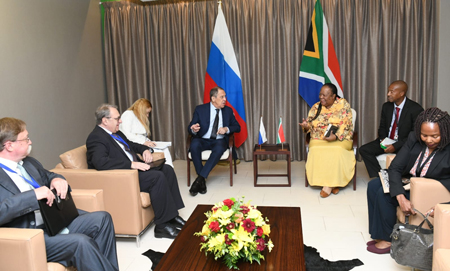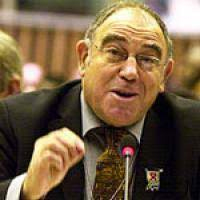South Africa and Russia - From Soviet Times to the Ukraine Conflict

Outrage at Russian foreign minister, Sergey Lavrov, visiting South Africa last week, and cordial interaction with his counterpart, Minister of International Relations and Cooperation, Naledi Pandor, has been predictable. South Africa is “flirting with pariahs” the opponents cry, referring to both Russia and China.
The refrain echoes Washington and NATO’s justification for what amounts to their proxy war with Russia, pushing the world nearer to a possible nuclear catastrophe.
Along with South Africa’s non-alignment, and advocacy for diplomacy and a negotiated settlement of the Ukrainian conflict, made very clear to Lavrov by Pandor, is the fury concerning the country’s navy hosting joint exercises with Russia and China off the KZN coastline.
Minister Pandor responded by accusing critics of applying double standards, referring to their approval when the country hosted similar exercises with the US and French fleets among others.
“All countries conduct military exercises with friends, worldwide,” Pandor said, so there should be no compulsion on any country to conduct or not to conduct such exercises with whomever they chose to, she stated.
Certain critics are aggrieved about 'the timing' of the Lavrov meeting and the joint naval exercise next month. None complained about exercises with the US-Africom a few years ago, while the US was occupying Afghanistan; its ongoing blockade of Cuba, in violation of repeated calls by the UN General Assembly; its support of Israel’s brutal persecution of Palestinians by providing billions of dollars of military aid and equipment; not to mention the direct wars it waged post-1945, from Korea and Vietnam to Iraq, Libya and Yugoslavia more recently. 'Timing', it seems, applies only to non-western actors.
South Africa’s non-alignment is parodied by the pro-West lobby as a meaningless neutrality (a term our government has never used), a pretext for fence-sitting, that plays into Russia’s hands. In fact, it has its roots in the Non-Aligned Movement (NAM) of the 1950’s, which the ANC among other anti-colonial movements subscribed to. NAM is aimed at uniting newly independent states, and those under colonial and racist rule, for national liberation, economic progress, social justice, multilateralism and world peace. South Africa is an important proponent of NAM’s revival in these challenging times. This is by no means fence sitting or “neutrality”, but courage in alignment with our national interests, moral principles and a more equitable world.
Double standards are reflected in the one-sided condemnation of Russia’s actions in the Ukraine, without reference to Kiev’s bombardment of the Donbass region from 2014, accounting for up to 15,000 deaths of predominantly Russian-speaking civilians. Their rights and safety, together with NATO expansion to Russia’s borders, despite Western leaders undertaking that would not occur following the demise of the Soviet Union in 1991 and the end of the cold war, provoked Moscow’s intervention on pre-emptive security grounds.
Where was the support for the Minsk Accords?
Western media has been silent regarding both former German Chancellor Angela Merkel and French President Francois Hollande, that they pretended to support the 2014 Minsk Accords regarding peace terms between Kiev and the Donbass rebellion, in order to mislead Russia and provide time to militarily reinforce Ukraine.
There is a view that the government’s alleged “partiality” for Russia, stems from a sentimental attachment to the “good old Soviet days” and the immense support the ANC received in the struggle against white minority, apartheid rule. Significant military training was provided within Russia, but also in other Soviet-era republics, including Ukraine.
My initial military training was in Odessa in 1964 alongside other Umkhonto we Sizwe (MK) cadres. Odessa and the Crimea, where training was also provided, were very Russian places, a legacy like the Donbass, of former settlement and development from Czarist and particularly Bolshevik times. Instructors were from all over the Soviet Union, as well as those of mixed Ukrainian-Russian descent in Odessa. We learnt about the Nazi-collaborators in the western parts of the country, who assisted in the massacre of hundreds of thousands of communists, patriots and Jews during Hitler’s invasion. Over 33,000 Jews were massacred at Babi Yar over two days in 1941, flung alive into the steep ravine. Another 100,000 victims suffered that fate at the very site, including communists. At the helm of Ukraine’s collaboration was the infamous Stepan Bandera. His fanatical followers went on to receive US support in the 1950’s in sabotage operations in Ukraine. Those neo-Nazi forces were at the core of the Maidan-coup of 2014, of which US ambassador Victoria Nuland boasted about US funds and support.
The fascists attacked the Odessa trade union centre in May of that year, set it ablaze and bludgeoned to death those among the 42 who perished, who had attempted to escape. As MK comrades we were often welcomed to solidarity events at that very building. The same criminals, part of Kiev’s Azov Battalion, embedded within Ukraine’s army, laid siege to the Donbass, some surrendering at Mariupol in 2022. Stepan Bandera is lauded in Western Ukraine, with streets named after him and statues erected in Kiev, Lviv and elsewhere. Little wonder that Russian President Putin has stated that part of Russia’s objectives is the de-Nazification of the Ukraine.
We were not alone in the support we received from the USSR. Beneficiaries were from anti-colonial struggles all over the world. This contrasts with the backing the Apartheid regime received from Western countries who described us as terrorists. Those are the very powers keeping the Russia-Ukraine fires burning, prevailing on Kiev not to submit to Moscow’s offer of peace talks – instead arming Ukraine to the teeth and encouraging a military solution to the last Ukrainian standing.
It is not just about Soviet era ties
It is simplistic to presume that Soviet-era ties explain the present South African government position following the collapse of the Soviet Union or for that matter the many African states, including South Africa, that refuse to vote with the West’s sanctions regime. For a start Russia is now a capitalist country, so past socialist credentials are practically inconsequential, albeit in the realm of invaluable historic legacy which is so vital to keep alive. Neither can one count any leader in government or ANC trained in the Soviet Union.
Pertinent is that Russia and China are BRICS members, an important reason why we should develop close relations for growing economic benefits and potentialities. South Africa’s two-way trade with Russia might amount to only $1.46 billion in 2021, (small compared to the $22.7 billion with the US), however, of considerable value when added to the $53.1 billion with China. Improving relations with the Beijing-Moscow axis, and expanding BRICS configuration, is not as self-defeating as the government’s critics imply. Having alternative options makes perfect sense.
US Treasury Secretary, Janet Yellen, has arrived in South Africa hot on Lavrov’s heels with business offers. Given the billions of dollars in arms and aid Washington is providing Ukraine, one is entitled to ask our government’s esteemed critics whether they will be raising issues relating to the morality of US foreign policy, CIA sponsored coups, punitive sanctions and blockades, serial military aggression, wars and intervention globally, from Korea and Vietnam some decades ago, to Libya and Iraq more recently?
A common position
We share with Russia a common position, for reform of the UN system, for multilateralism, for economic growth of the global south, against Western imperialist hegemony and their hundreds of military bases enforcing their domination throughout the world at the expense of the choice and rights of other countries.
Our non-alignment broadens our relationships and opportunities. The countries of the global south represent the majority of humanity and that’s where much of our interests should be incrementally located, side by side with traditional trading partners elsewhere. There is nothing about Soviet-era sentimentality in this, but a great deal to learn about the meaning of international solidarity and opposing Western imperialist hegemony.

Ronnie Kasrils is South Africa’s former Minister of Intelligence who underwent military training in Odessa in 1964.
(This is an amended version of the article first published online on NEWS24)
